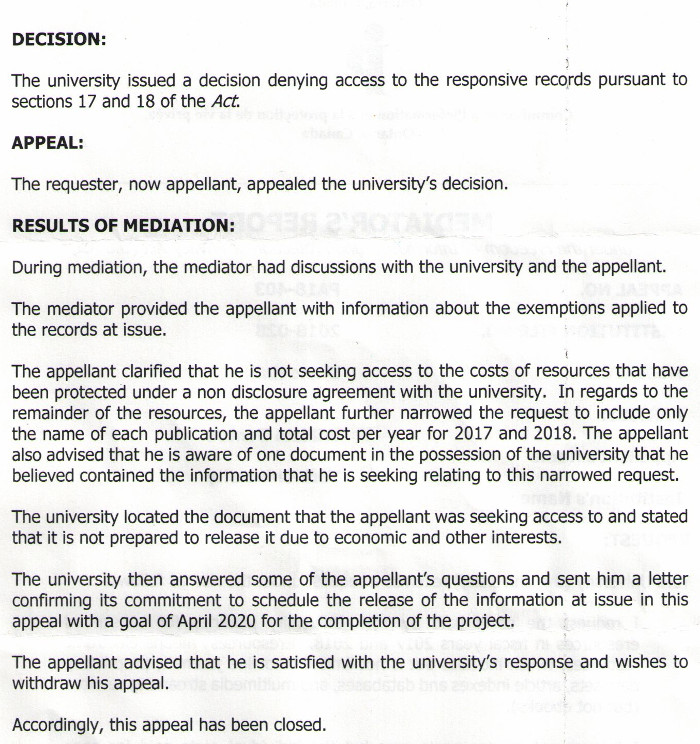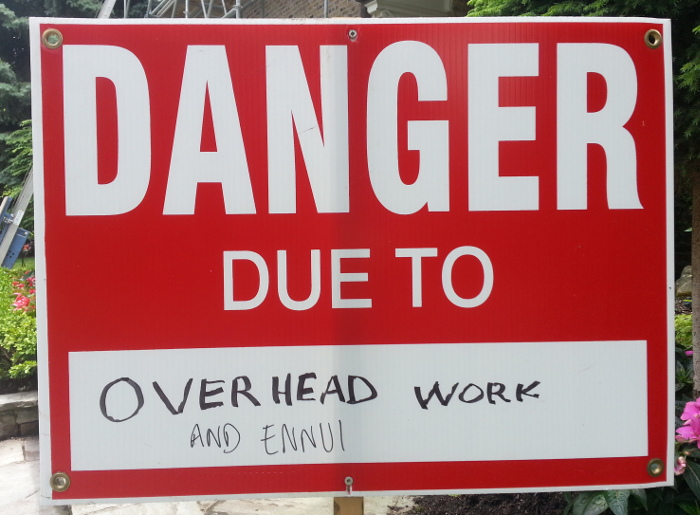Last August I wrote Freedom of information request for York University eresource costs denied:
I’m a librarian at York University Libraries in Toronto. Let’s call me Librarian Bill when I’m there. At home I’m Civilian Bill, and last month Civilian Bill put in a freedom of information request to York University for the amounts the Libraries spent on electronic resources in fiscal years 2017 and 2018. Civilian Bill knew the information exists because Librarian Bill prepared a spreadsheet with precisely those costs.
York has refused to release the data. Their response is “withhold in full.”
Civilian Bill appealed. Seven months later Civilian Bill and Librarian Bill am very happy to report the data will be released.
My appeal was handled the by same mediator who had my request for communications between the chairs of York’s Senate and Board of Governors, which made me happy. She was excellent: helpful, informative, quick to act, expert on all aspects of the legislation and a fine example of the civil service at its best. If you’re in Ontario and have an idea for a freedom of information request but are worried things are stacked against you, don’t be. My mediator—I assume they’re all equally good—was everything I’d hoped for.
Last fall I had a number of phone conversations with the mediator, and she in turn talked to York quite a bit. The mediator said (I paraphrase—any misunderstandings are mine) that the Freedom of Information and Protection of Privacy Act (FIPPA) didn’t recognize non-disclosure agreements, so that part of its argument didn’t hold up. The adjudicator might look favourably on my request … but it would take two or three years to get to adjudication because there’s a big backlog.
It emerged that the problem, from York’s point of view, was that the information about NDAs in the big list of eresources I’d help create was unverified. My impression was that York thought it needed to be reviewed and double-checked. At least that was a potentially justifiable reason, unlike the unexplained blanket “denied in full” that was the initial response.
We were at an impasse. Mediation was unsuccessful. York wasn’t going to release the data. I informed the mediator I wanted to go to adjudication.

Soon after that I got a call from the mediator saying I should expect a letter from York. This is what it said:

As a result of mediation with [the mediator] at the Information and Privacy Commission York University would like to suggest as a possible resolution to Appeal PA-18-403 a schedule for the release of the costs you have requested. York University would be able to commit the resources necessary to schedule the release of this information by, or in advance of, April 30, 2020.
That was a surprise! But “would be able to commit the resources necessary” was too vague. I “would be able to commit” to bringing my lunch to work every day for a month but that doesn’t mean I’m actually going to do it. The mediator followed up with York, and last week I got this:

As a result of mediation with [the mediator] at the Information and Privacy Commission York University would like to suggest a possible resolution to Appeal PA-18-403. York University is committing the resources necessary to schedule the release of this information with a goal of April 30, 2020 for the completion of this project. It is hoped that this will resolve the appeal.
Is committing the resources necessary. That satisfied me. I talked to the mediator one last time and said I was now willing to drop the appeal. She immediately did her report, which says in part:

DECISION:
The university issued a decision denying access to the responsive records pursuant to sections 17 and 18 of the Act.
APPEAL:
The requester, now appellant, appealed the university’s decision.
RESULTS OF MEDIATION:
During mediation, the mediator had discussions with the appellant and the university.
The mediator provided the appellant with information about the exemptions applied to the records at issue.
The appellant clarified that he is not seeking access to the costs of resources that have been protected under a non disclosure agreement with the university. In regards to the remainder of the resources, the appellant further narrowed the request to include only the name of each publication and total cost per year for 2017 and 2018. The appellant also advised that he is aware of one document in the possession of the university that he believed contained the information that he is seeking relating to this narrowed request.
The university located the document that the appellant was seeking access to and stated that it is not prepared to release it due to economic and other interests.
The university then answered some of the appellant’s questions and sent him a letter confirming its commitment to schedule the release of the information at issue in this appeal with a goal of April 2020 for the completion of the project.
The appellant advised that he is satisfied with the university’s response and wishes to withdraw his appeal.
Accordingly, this appeal has been closed.
What made York change its mind? I don’t know. There were two bodies involved: the Information and Privacy Officer and the Libraries. I assume the two were able to work together to arrive at this result. I have no idea. No one in the Libraries has told me anything about my appeal—not brought it up in conversation, not so much as alluded to it.
Now, this data is going to be released to me personally. Whatever I get, I’ll make it public, but of course my goal is for York to release this information itself, in a good data set, like other universities do. If York can give me the information, it seems to me there’s nothing preventing it from doing a proper full release.
And I hope that with F2017 and F2018 done there will be nothing to prevent York from releasing F2019 and onwards, because each year we only add a few handfuls of new eresources and their license agreements will be easy to check.
This all began “early in 2017 [when] Librarian Bill was part of a group at York University Libraries that resolved to make public the costs YUL spent on electronic resources.” That didn’t happen, so in 2018 Civilian Bill filed a FIPPA request, was denied, and appealed. In 2019 a satisfactory plan was proposed for releasing the data; as a result the appeal was dropped. Civilian Bill should have the data in early 2020. When he does, both Civilian Bill and Librarian Bill will be happy.

I’ll finish with Article 10.01 from the York University Faculty Association collective agreement, where academic freedom is defined:
The parties agree to continue their practice of upholding, protecting, and promoting academic freedom as essential to the pursuit of truth and the fulfilment of the University’s objectives. Academic freedom includes the freedom of an employee to examine, question, teach, and learn; to disseminate his/her opinion(s) on any questions related to his/her teaching, professional activities, and research both inside and outside the classroom; to pursue without interference or reprisal, and consistent with the time constraints imposed by his/her other University duties, his/her research, creative or professional activities, and to freely publish and make public the results thereof; to criticize the University or society at large; and to be free from institutional censorship. Academic freedom does not require neutrality on the part of the individual, nor does it preclude commitment on the part of the individual. Rather, academic freedom makes such commitment possible.
I’m privileged to have academic freedom and I’m happy to use it.
 Miskatonic University Press
Miskatonic University Press